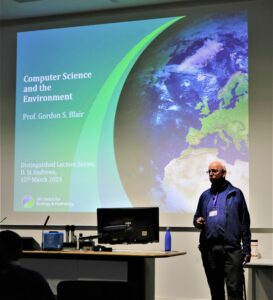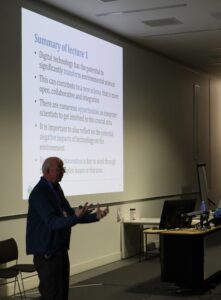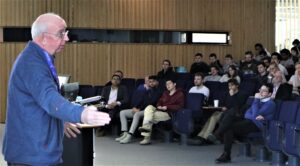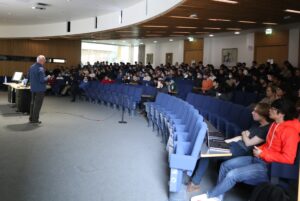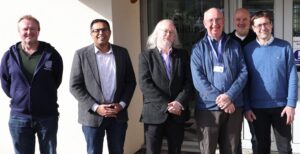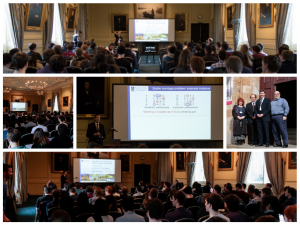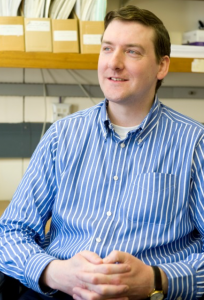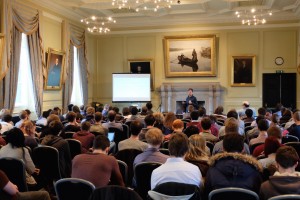What Every Computer Scientist Should Know About Computer History
Update: Lectures will be live streamed at this link.
Distinguished Lecture Series, Semester 1, 2017-18
Biography:
Professor Ursula Martin CBE FREng FRSE joined the University of Oxford as Professor of Computer Science in 2014, and is a member of the Mathematical Institute. She holds an EPSRC Established Career Fellowship, and a Senior Research Fellowship at Wadham College. Her research, initially in algebra, logic and the use of computers to create mathematical proofs, now focuses on wider social and cultural approaches to understanding the success and impact of current and historical computer science research.
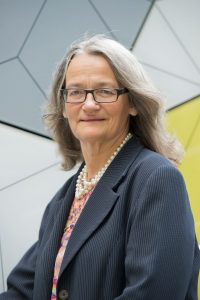
Prof Ursula Martin
Before joining Oxford she worked at Queen Mary University of London, where she was Vice-Principal for Science and Engineering (2005-2009), and Director of the impactQM project (2009-2012), an innovative knowledge transfer initiative. She serves on numerous international committees, including the Royal Society’s Diversity Committee and the UK Defence Science Advisory Council. She worked at the University of St Andrews from 1992 – 2002, as only its second female professor, and its first in over 50 years. She holds an MA in Mathematics from Cambridge, and a PhD in Mathematics from Warwick.
Timetable:
9.30 Introduction
9.35 Lecture 1: The early history of computing: Ada Lovelace, Charles Babbage, and the history of programming
10.35 Break with Refreshments Provided
11.15 Lecture 2: Case study, Alan Turing, Grace Hopper, and the history of getting things right
12.15 Lunch (not provided)
2.30 Welcome by the Principal, Prof Sally Mapstone
2.35 Lecture 3: What do historians of computing do, and why is it important for computer scientists today
3.30 Close
Lecture 1. The early history of computing: Ada Lovelace, Charles Babbage, and the history of programming
IN 1843 Ada Lovelace published a remarkable paper in which she explained Charles Babbage’s designs for his Analytical Engine. Had it been built, it would have had in principle the same capabilities as a modern general purpose computer. Lovelace’s paper is famous for its insights into more general questions, as well as for its detailed account of how the machine performed its calculations – illustrated with a large table which is often called, incorrectly, the “first programme”. I’ll talk about the wider context; why people were interested in computing engines; and some of the other work that was going on at the time, for example Babbage’s remarkable hardware description language. I’ll look at different explanations for why Babbage’s ideas did not take off, and give a quick overview of what did happen over the next 100 years, before the invention of the first digital computers.
Lecture 2. Case study, Alan Turing, Grace Hopper, and the history of getting things right
Getting software right was a theme of programming for the days of Babbage onwards. I’ll look at the work of pioneers Alan Turing and Grace Hopper, and talk about the long interaction of computer science with logic, which has led to better programming languages, new ways to prove programmes correct, and sophisticated mathematical theories of importance in their own right. I’ll look at the history of the age-old debate about whether computer science needs mathematics to explain its main ideas, or whether practical skills, building things and making things simple for the user are more important.
Lecture 3: What do historians of computing do, and why is it important for computer scientists today
When people think about computer science, they think about ideas and technologies that are transforming the future – smaller faster smarter connected devices, powered by, AI, and big data – and looking at the past can be seen as a bit of a waste of time. In this lecture I’ll look at what historians do and why it is important; how we get history wrong; and in particular often miss the contribution of of women. I’ll illustrate my talk with my own work on Ada Lovelace’s papers, to show how detailed historical work is needed to debunk popular myths – it is often claimed that Lovelace’s talent was “poetical science” rather than maths, but I’ve shown that she was a gifted perceptive and knowledgeable mathematician. I’ll explain how the historian’s techniques of getting it right can help us get to grip with topical problems like “Fake news”, and give us new ways of thinking about the future.
Event details
- When: 10th October 2017 09:30 - 16:00
- Where: Byre Theatre
- Series: Distinguished Lectures Series
- Format: Distinguished lecture


